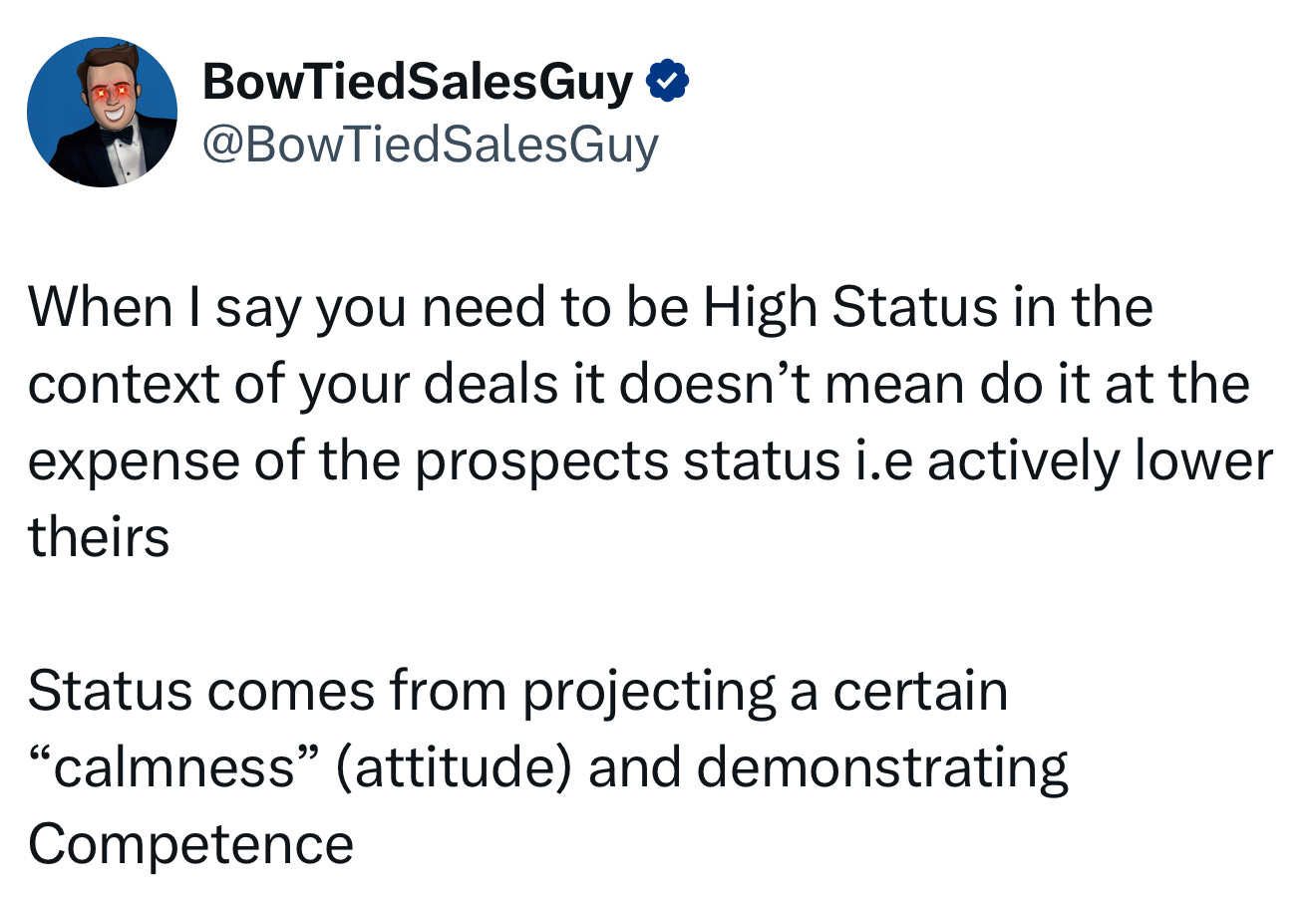What Emotional Intelligence looks like
Acting in unexpected ways can bring unexpected results
Those who follow me know my approach to sales is contrarian.
This is by design.
I was tired of feeling like a loser in front of prospects. So I changed.
I always knew on some level that if the information I’m consuming is mainstream then it has lost much of its competitive advantage.
This presented a problem and an opportunity.
Problems & Opportunities are 2 sides of the same coin.
The Opportunity here?
Stay on the bleeding edge of sales tactics & strategies
Ruthlessly execute on it until it may or may not lose its effectiveness (goes mainstream)
Measure results & make necessary adjustments
Repeat
My MO became:
Learn unconventional methods *and* behave differently than what is expected of me.. and then see what happens
In order to achieve positive outcomes (ex. close more deals) we must first have the courage and open mindedness to accept negative outcomes (ex. nuking deals) in pursuit of achieving those positive outcomes.
It comes with the territory.
There isn’t much to lose if you are currently performing poorly. You’re already losing deals by behaving “normal” so what’s there to lose by changing? Emotional comfort? Get real lol
On the other hand, if you are a good performer there is more to lose.
Your changes can negatively impact your results and cause your performance to spiral (this has happened to me many times)
The known, or your comfort zone, has an enticing pull to keep you there.
So it might be better for you to not rock the boat.. but you’ll also have to accept never knowing what top performance looks and feels like.
Ask yourself if this is Okay to you and answer it honestly.
Frame is found in the unknown
An example of the known: The prospects expectations of me to act a certain way which have been reinforced for years. And me behaving exactly as they expect.
As a result, I give up my personal power to them. I lose the Frame.
Another Known: If the prospect expects me to act a certain way, and I don’t, I reclaim my personal power. I control the Frame.
What’s unknown: How my results will be impacted by the change in behavior
Note: Reclaiming your personal power doesn’t guarantee positive outcomes. Execution is super important here.. “Changing your behavior” isn’t an invitation to be rude or aggressive towards prospects. The key to changing your behavior (defying expectations) is doing it in a respectful way that doesn’t make the prospect feel “Not OK” with themselves.
You need to become Nurturingly Assertive with your buyers.
This means stating your boundaries, what works / doesn’t work for you while making sure the prospect doesn’t feel Not OK.
It’s you protecting & prioritizing your best interests and assuring the prospect that whatever they choose to do is okay with you.
This is Emotional Intelligence.
What do you feel?
Most people don’t know what they feel.
They also don’t have effective strategies for how to deal with their feelings.
The causes for this are often because:
They’re conditioned not to feel these feelings
They’re conditioned not to feel them too intensely
And if they do feel them, they’re conditioned not to be too aware of them.
We were conditioned to be out of touch with our natural feelings by how we responded to / adapted to / and interacted with the Authority figures in our lives i.e parents, teachers, society, etc
People who are good at knowing what they feel have a competitive advantage over everyone else.
Their “gut instinct” is highly accurate. They develop a good “feel” for life, and a talent for doing many things (i.e Talent Stacking comes easier to them. h/t Scott Adams)
People who know what they feel often become very successful.
They can be grouped into 2 categories..
Category 1: Never received this conditioning in the first place
Category 2 (the majority): Received this conditioning but now chooses to reject the conditioning / programming
Most people base their actions on what they think they need to do whereas those with a more productive life plan will do things based on how they feel.
They will obviously think about things before acting, but their final decisions are always based on what they feel.
And since they haven’t cut themselves off from their feelings (i.e decided not to feel), their final decisions are almost always based on intuition which often leads to success.
“But SalesGuy, I’m not dead inside. I know that I feel things!”
Yes, you know that you feel, but you often don’t know what you feel.
Often the fact that you’re feeling something is only a vague awareness in the back of your mind.
You’re not close enough to your feelings to know what they are, and you don’t know how to operate from them.
Intelligence doesn’t have nearly as much to do with being successful as one would think. The biggest thing that does is knowing what you feel.
This type of Self Awareness indicates the potential to succeed.
Then it’s a matter of what decisions one makes in regards to using this potential.
This is Emotional Intelligence.
Tips for knowing how you feel
Keeping ourselves out of the present moment prevents us from accurately identifying what we feel. Stopping yourself periodically throughout the day to check in with yourself can go a long way.
Focus on what you feel both emotionally and physically. Are your muscles tight? Which ones? Are you angry or sad? Identify what are you feeling and don’t be afraid to “call it”
Become aware of what is happening in your surroundings. Notice things like the environment, the temperature, and the lighting. Are you relaxed or still in your head (i.e staying out of the present)
Make sure you are not substituting projections and descriptions of feelings for real feelings. A projection can hint at what we might be feeling but often leads us to be more confused
Projection: I feel stupid because I keep saying the wrong things to prospects.
“Feeling stupid” isn’t a feeling. They are judgmental words and are not an accurate expression of what you feel; they are accurate expressions of what you think. If you can’t identify the actual feeling then you can’t change / influence the feeling. And as a result you will continue to stay confused and “feel all over the place”
Real feeling: I feel disappointed and frustrated
Feeling disappointed and frustrated are feelings and legitimate emotional responses. Once you’ve identified the true feeling, Let yourself feel it, and then decide to influence it (if you want)
Example: “I feel disappointed and frustrated because I say the wrong things in front of prospects. I don’t want to feel disappointed and frustrated anymore so what steps do I need to take in order to influence this feeling / stop feeling this way?”
Projection keeps you confused and/or suffering.
Real feeling puts you into problem solving mode.
Some questions to ask yourself to get you moving in the right direction:
How do you spend most of your day and is that satisfactory to you?
What are some awkward & troublesome moments you’ve had in your sales interactions? These often provide the best clues as to what we need to work on
What do you get out of what you are currently doing? Do the outcomes serve you? Be honest.
There are no good or bad emotions
I don’t like to label emotions as “good” or “bad”
Context matters which is also why I prefer to use terms like “productive” and “unproductive” instead.
Every emotion is a natural part of the human experience. It’s hard coded into us. Where we can run into problems is our responses to those emotions.
Let’s say you notice that you get scared whenever you are setting the Frame in the beginning of your calls and you want to stop feeling this way.
First thing you should do is accept that you feel scared when setting the Frame in the beginning of your calls. At the moment, you can’t control your emotional response. The “hook” is real. It’s there. Trying to resist it will only make you feel more scared.
But what you can control is what you do despite feeling scared.
You continue setting the Frame in the beginning of your calls despite being scared because you know it is important to do so.
Over time you will probably notice that your delivery improves and you also don’t get as scared as you once did. This is you influencing your fear (unproductive emotion in this context) with more productive emotions like satisfaction & contentment (because you are doing what is important despite feeling scared)
Behaviors influence emotions.
Emotional Intelligence is being able to turn down the volume on the emotions that don’t serve us by moving towards emotions & actions that do.
Disclaimer: None of this is to be deemed mental health advice of any kind. These are opinions written by an anonymous cartoon with a background in sales.






Great post, love the long-form content BTSG 🐲
People underestimate what EI / EQ can do for you in relationships, career, and sales!